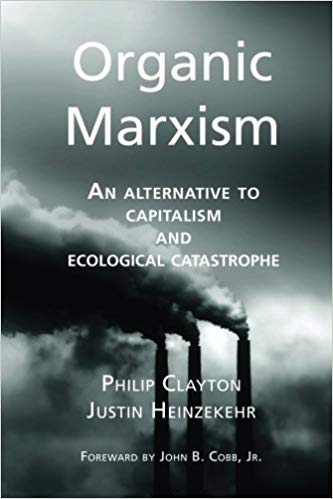Organic Marxism Audiobook (Online) by Philip Clayton
Organic Marxism Audiobook by Philip Clayton
.

Organic Marxism Audiobook by Philip Clayton
.
.
textIf you resemble me as well as have actually ever doubted what a “treatment Marxism” would definitely look like, the recently released Organic Marxism: An Alternating to Commercialism as well as Ecological Disaster by Philip Clayton as well as additionally Justin Heinzekehr is an interesting vision of such a possibility.
It remains in fact the preliminary extreme initiative to fold procedure point of view, in both Whiteheadian as well as additionally Chinese types, right intoMarxism Organic Marxism Audiobook by Philip Clayton Online. The result is what the writers call “Organic Marxism”, a helpful postmodernism for our time of eco-friendly problem that makes use of scholastic as well as valuable opportunities for a brand-new eco-friendly human.
Organic Marxism is released by Refine Century Press in prep work for the 10th Whitehead International Workshop in June 2015, which is called “Searching for an Alternating: Towards an Ecological Globe.” I intend to sign up with the conference, as well as additionally advise everyone that can to do so as well. It will certainly unify a few of among one of the most vital numbers in the eco-friendly task, including Expenditure McKibben as well as Vandana Shiva, along with a lot of one of the most significant treatment thinkers, including John Cobb, Catherine Keller, Joseph Bracken, Bruce Epperly, William Connoly, Monica Coleman, Roland Faber, Marjorie Suchocki, Jay McDaniel, as well as additionally Philip Clayton, together with more youthful treatment thinkers like Tripp Richer, Brianne Donaldson, as well as Justin Heinzekehr. As well as possibly not remarkably, after co-writing Organic Marxism, Clayton will certainly be leading a conversation on Marx as well as Whitehead.
Having actually previously released 22 publications as well as great deals of articles, Clayton’s vital operate in thoughtful faith as well as additionally the clinical study as well as additionally faiths conversation is by currently familiarized to various. He is a teacher at Claremont Establishment of Faith where Justin Heinzekehr, his graduate as well as presently co-author, is furthermore a doctoral possibility in confidence. Because their job is largely in faith as well as additionally faith, this magazine on environmentally friendly organization economics along with national politics can appear a bit uncommon. As well as additionally yet both of them work within the institution of treatment idea, which is an amazingly varied custom-made that branch off right into generally every place of scholastic study. In various methods, Organic Marxism takes its lead from the work of the superb procedure theologian John B. Cobb Jr., that makes up the in advance to this magazine. After beginning his occupation as a Christian thoughtful theologian, he transformed by the very early 1970s right into a focus on an option of different other subjects, consisting of business economics, biology, concepts, national politics as well as ecology. Creating among the preliminary book- size thoughtful messages on the eco-friendly problem, Cobb later on took place to create a large solution eco-friendly business economics with the financial expert Herman Daly, which functions as the considerable inspiration for Clayton along with Heinzekehr’s financial proposals inOrganic Marxism
At the core of the book is the sentence that “International commercialism has really created the best eco-friendly as well as additionally altruistic disaster in the background of human world” (4 ). Throughout Organic Marxism, Clayton along with Heinzekehr make a collection of effective as well as additionally encouraging disputes to reveal that this continues to be actually the scenario which the best choice is Organic Marxism, which attests “hybrid [financial] systems that integrate profit-making tasks with standards that are produced to stay clear of corruption, ecological misuse, as well as the excessive acquisition of wide range by a handful of individuals” (236 ). By reinterpreting Marx versus the leading Western assumptions of him, they recommend that “socialist systems can preserve a suitable location for organization jobs … suitably restricted market stress can benefit the public great” along with ordinary the framework for a brand-new ecological lifestyle (47 ).
They therefore withstand a sight of Marxism that would entirely remove any type of place for market stress, rivals, along with exclusive possession (7 ). For them, the case importance of Marx has much less to do with his campaigns to validate a rigorous dialectical materialism as well as additionally much more to do with his “job as a social philosopher, a chronicler of organization economics, as well as a pupil of the course battle” (60 ). They in addition decrease the timeless Marxist concept that ideas, ideology, as well as faith are impotent as well as merely “epiphenomenal,” with no liberating power. In an all-natural perspective (as understood within treatment idea), postmodern scientific research as well as point of view difficulty this kind of impolite reductionism with a far more flexible, relational, pluralistic, contextual, as well as additionally environmentally friendly layout ofMarxism
Due to this, Clayton along with Heinzekehr are extremely conscious the regular sights of Marx as deterministic, anthropocentric, anti-religious, reductionistic, totalizing, as well as additionally optimistic. As well as additionally yet they suggest for the persisting relevance of Marx past these modernist constraints as well as additionally stereotypes of his concept, significantly making use of current analyses of his totally expanded idea (e.g., Jeremy Bellamy Foster) that stress Marx’s indicated eco-friendly worries. Organic Marxism Audio Book Free. They in addition take into consideration some existing initiatives to renovate Marxism in the work of Jacques Derrida, Slavoj Zizek, as well as David Harvey. Although they recognize the well worth of each of these vital as well as deconstructive thinkers, they eventually end that each of them “stay clear of handling the practical worries that policymakers encounter” (94 ).